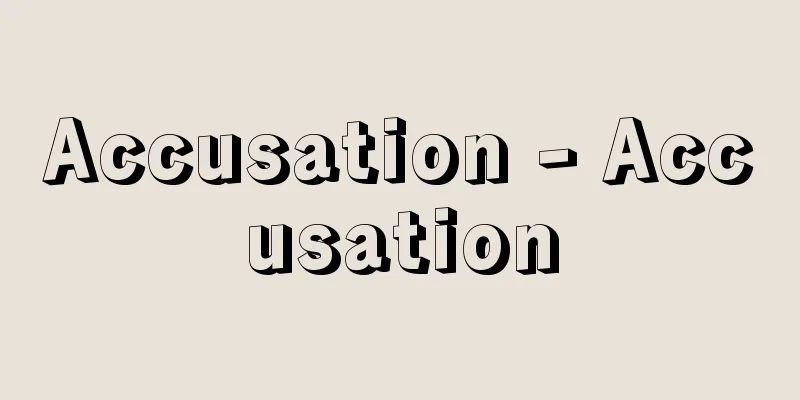Accusation - Accusation

|
A complaint is a declaration of intent made by a person with the right to file a complaint, such as a victim of a crime, to an investigative agency to report the facts of a crime and to request the prosecution of the perpetrator. The right to file a complaint is made by the victim of the crime, the victim's legal representative, the victim's relatives in certain cases, the victim's spouse, lineal relatives, and siblings in the case of the victim's death, and in the case of a crime of defamation, the victim's relatives and descendants in the case of the victim's death (Criminal Procedure Law, Articles 230 to 233). Complaints are made in writing or orally to a public prosecutor or judicial police officer (Criminal Procedure Law, Article 241). When a complaint is made orally, a record of the complaint is prepared. However, in practice, oral complaints are rare. This is because complaints tend to be accepted carefully in writing to avoid so-called civil cases being prosecuted in the form of criminal cases. However, when it is difficult to ask the victim, who is an amateur in law, to prepare a complaint, oral complaints should also be accepted. As a result of filing a complaint, an investigation will be initiated and judicial police officers will be obligated to promptly send any documents and evidence related to the complaint to the public prosecutor (Article 242 of the same law), and the public prosecutor will be obligated to notify the person who filed the complaint of the decision to prosecute or not (Article 260 of the same law), and also to inform the person who filed the complaint of the reasons for not prosecuting if requested (Article 261 of the same law). Crimes that require a complaint to bring a public prosecution are called private prosecutions. Examples include defamation, insult, disclosure of secrets, negligent injury, destruction of private documents, destruction of property, certain kidnappings, and certain thefts between relatives. These are divided into absolute private prosecution crimes (such as defamation), which always require a complaint, and relative private prosecution crimes (such as theft between relatives), which require a certain status relationship. Since a complaint is a condition for a private prosecution, if a prosecutor brings a public prosecution without a valid complaint, it is considered to be invalid because the procedure for bringing the prosecution violated the provisions, and a judgment of dismissal of the prosecution will be rendered (Article 338, paragraph 4 of the same law). Sexual crimes were considered crimes that required a complaint until the 2017 revision of the Penal Code (Article 180 of the old Penal Code), but after the revision, they are no longer crimes that require a complaint. Sexual crimes include indecent assault, forced sexual intercourse, etc. (the name of the crime that was rape before the revision was changed), as well as the newly established crimes of indecent assault with a guardian and sexual intercourse with a guardian, all of which are now non-prosecutable. Until now, sexual crimes were considered crimes that required a complaint because it was considered necessary to respect the victim's wishes and protect their privacy when it comes to the punishment of sexual crimes. However, it was recognized that in many cases, victims who have suffered great psychological damage from sexual assault feel pressured to choose whether or not to file a complaint, or are worried that they will be retaliated against by the defendant if they file a complaint, and that the fact that the crime is a non-prosecutable offense causes a mental burden on the victim. It was therefore considered appropriate to eliminate the mental burden on the victim by making it a non-prosecutable offense. However, since the purpose of the legal reform is to reduce the mental burden on victims, it goes without saying that even after a crime has been made a non-complaint offense, appropriate consideration should be given to the feelings of victims when conducting an investigation or when prosecutors decide on dispositions. There are special provisions in the complaint procedure for private prosecution. In other words, for private prosecution, there is a limit on the period for complaint, which requires that a complaint must be filed within six months from the date on which the perpetrator is known (Criminal Procedure Law, Article 235). In contrast, there is no limit on the period for complaint for non-private prosecution, so a complaint can be filed until the statute of limitations expires. In addition, for private prosecution, if there are multiple complainants, the period for each proceeds independently (Criminal Procedure Law, Article 236), and a complaint may only be withdrawn up until the initiation of prosecution (Criminal Procedure Law, Article 237, Paragraph 1), and once a prosecution has been instituted, the complaint cannot be withdrawn. Furthermore, there is a principle of indivisibility of complaint for private prosecution, and a complaint or withdrawal of a complaint made against one or more accomplices for a private prosecution also has effect against the other accomplices (Criminal Procedure Law, Article 238). This is called the subjective indivisibility of a complaint. Also, a complaint or withdrawal of a complaint made against part of the criminal facts has effect against the whole of the facts. This is called the objective indivisibility of a complaint. When each part of a criminal offense has a different victim, it is considered that the effect of a complaint made by one of the victims does not extend to the facts concerning the other victims. Incidentally, a complaint is a concept unique to criminal cases, and in civil cases, private individuals can file lawsuits in court, so the concept of a complaint does not exist in civil cases. [Ichiro Uchida and Morikazu Taguchi, January 19, 2018] [Reference] | | |Source: Shogakukan Encyclopedia Nipponica About Encyclopedia Nipponica Information | Legend |
|
犯罪の被害者等の告訴権者が、捜査機関に対し、犯罪事実を申告し、犯人の訴追を求める意思表示である。告訴権者は、犯罪の被害者、被害者の法定代理人、一定の場合に被害者の親族、被害者死亡のときは被害者の配偶者・直系親族・兄弟姉妹、また名誉毀損(きそん)罪につき被害者死亡のときは被害者の親族・子孫である(刑事訴訟法230条~233条)。告訴の方法は、書面または口頭により、検察官または司法警察員に対して行う(同法241条)。口頭のときは告訴調書が作成される。もっとも、実際には口頭による告訴は少ない。いわゆる民事事件が刑事事件の形をとって告訴されることを避けるために、告訴の受理は書面をもって慎重に行われる傾向があるからである。しかし、告訴状の作成を法律の素人(しろうと)である被害者に要求することが困難な場合には、口頭による告訴も受理すべきものとされている。 告訴の効果として、これによって捜査が開始され、司法警察員は、告訴に関する書類・証拠物を速やかに検察官に送付する義務を負い(同法242条)、検察官は、起訴・不起訴の処分を告訴した者に通知する義務を負い(同法260条)、また、告訴した者から請求があるときは不起訴理由を告知する義務を負う(同法261条)ことになる。 公訴の提起に告訴を必要とする犯罪を親告罪という。たとえば、名誉毀損罪・侮辱罪、秘密漏示罪、過失傷害罪、私用文書等毀棄罪・器物損壊罪、一定の略取誘拐罪、一定の親族間の窃盗罪等である。これらは、つねに告訴が訴訟条件となる絶対的親告罪(たとえば名誉毀損罪)と、一定の身分関係を前提とする相対的親告罪(たとえば親族間窃盗)とに分けられる。親告罪について告訴は訴訟条件であるから、有効な告訴がないのに検察官が公訴を提起した場合には、公訴提起の手続がその規定に違反したため無効であるときにあたり、公訴棄却の判決が下される(同法338条4号)。 なお、性犯罪については、2017年(平成29)の刑法改正までは親告罪とされてきたが(旧刑法180条)、改正後は親告罪ではないこととされた。ここにいう性犯罪には、強制わいせつ罪、強制性交等罪(法改正前までの強姦(ごうかん)罪の名称が変更された)に加えて、法改正で新たに設けられた監護者わいせつ罪および監護者性交等罪等が含まれ、これらすべてが非親告罪となった。これまで性犯罪が親告罪とされてきたのは、性犯罪の処罰については被害者の意思を尊重し、そのプライバシーを保護する必要があると考えられたからである。しかし、性的被害によって精神的に多大な被害を受けた被害者にとって、告訴するか否かの選択を迫られていると感じられたり、告訴により被告人から報復を受けるのではないかとの不安を抱く場合があるなど、親告罪であることによりかえって被害者に精神的負担を生じさせていることが少なくないと認識され、これを非親告罪化することで被害者の精神的負担を解消することが相当であるとされたのである。もっとも、法改正の趣旨が被害者の精神的負担の軽減にあるのであるから、非親告罪とされた後においても、捜査の実施や検察官の処分決定において被害者の心情に適切な配慮がなされるべきことは当然である。 親告罪の告訴については告訴手続に特則がある。すなわち、親告罪については、犯人を知った日から6か月以内に告訴をしなければならないという告訴期間の制限がある(刑事訴訟法235条)。これに対して非親告罪については告訴期間の制限はないので、公訴時効が完成するまでは告訴をすることができる。その他、親告罪の告訴については、告訴人が数人あるときは、告訴期間はそれぞれ独立して進行し(同法236条)、また、告訴の取消しは公訴提起までとされ(同法237条1項)、公訴が提起されればもはや告訴の取消しはできない。さらに、親告罪については告訴不可分の原則があり、親告罪について共犯の1人または数人に対してした告訴または告訴の取消しは、他の共犯に対してもその効力を生じる(同法238条)。これを告訴の主観的不可分という。また犯罪事実の一部に対してした告訴または告訴の取消しは、その全部について効力を生じる。これを告訴の客観的不可分という。処分上の一罪の各部分が被害者を異にするときは、被害者の1人がした告訴の効力は他の被害者に関する事実に及ばないと解される。なお、告訴は刑事事件に固有の観念であり、民事事件については私人が裁判所に訴えを提起することができるので、民事には告訴の観念はない。 [内田一郎・田口守一 2018年1月19日] [参照項目] | | |出典 小学館 日本大百科全書(ニッポニカ)日本大百科全書(ニッポニカ)について 情報 | 凡例 |
Recommend
Kajimakura
The title of a jiuta koto song. One of the represe...
School corporation - gakkou hojin
It is a corporation established for the purpose o...
Anu Ziggurat - Anu Ziggurat
...Because it is a symbolic structure unique to M...
Hilly area - Kyuuryoutai
It is one of the vertical distribution zones; in ...
Public transport - Public transport
Transportation businesses run by local governments...
Ptilonorhynchidae
…A general term for birds of the Ptilonorhynchida...
Characterology - Mojigaku (English spelling)
Due to the ideographic nature of Chinese character...
Cauchy-Hadamard's formula
… For a given power series, the upper bound ρ of ...
Basic Physiology
...However, the boundary between the two is not a...
Saga Domain
Also called Hizen Domain. A large outside domain ...
The problem of adding two divisions
A political issue surrounding the expansion of the...
Gauranitis - Gauranitis
…It is a strategically important site located at ...
Substitute transportation - Daikouyuso
Substituting automobiles for rail transport. For f...
Bai people (White) - Bái zú (English spelling)
One of China's minority groups. They live in t...
putto
...From the late Greek period to the Roman Empire...


![Asakura [town] - Asakura](/upload/images/67cad2b37de65.webp)




![Oshino [village] - Oshino](/upload/images/67cb1d3b37f46.webp)

